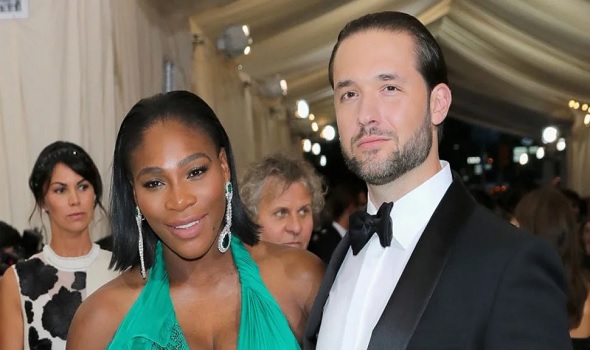News
Serena Williams’ Husband opens up on why parental leave is good for men

It’s mostly women who birth and feed babies, and therefore it is mostly women who are too often left to choose between healing from birth and adequately caring for their newborn, or a paycheck. It’s a choice few would want to make, and yet the vast majority of new moms are put in that position and suffer. As a result, women are more likely to get angry, and then more likely get loud.
But men also stand to benefit from paid parental leave. Spending time with one’s child and partner in the early days can have psychological, physical and even professional benefits in the long-run. Paid leave should be their fight, too. CNN spoke to Reddit cofounder, venture capitalist and paid leave advocate Alexis Ohanian — also known as husband to professional tennis player Serena Williams and — about why leave is good for men, why they should be fighting for leave, and why they are reluctant to speak up.
Alexis Ohanian: I didn’t grow up with any younger siblings, and I had never been around a baby, or conceived of being around a baby, until I was a dad. Paternity leave is how I got confident being around kids, because I got to spend that time learning and making mistakes and figuring it out. Now, even with a 4-year-old, I see the effects of this in even the most subtle ways because I know we were able to get through that period when they’re newborns and can’t tell you how they feel. Having that early experience makes every one of the problems going forward seem much more manageable, because I was able to develop the confidence I would have never gotten otherwise.
What kind of positive effects did taking paternity leave have on your marriage?
Ohanian: The arrival of a child is a time in our lives when everything we know gets upended. And even though we are not carrying the child or nursing the child, there is a role for men to play. Even in the best-case scenario, with a totally healthy pregnancy and childbirth, it lets you be there for your partner, and support them emotionally and physically.
My wife had a very public and difficult pregnancy, and in those scenarios it is vital. She was recovering from a number of surgeries after the birth of our daughter. And while we are in a situation where we have tremendous access and privilege and support, it was still a very difficult time. I am so grateful for the fact that I could spend time not just with our newborn, but also be there for my wife. That was indispensable.
But again, even if everything goes great, those early weeks are when you are figuring out how life is going to work now, and what your new routines are. To get a little bit more time to spend together, to be supportive, and be able to truly empathize with one another goes a long way for relationships. It’s still super hard, but taking parental leave helps make sure you get the best shot at getting off to a great start. It’s the kind of thing that has a ripple effect.
How can paternity leave benefit men professionally?
Ohanian: If your home is in a good place when you get back to work after the birth of a baby, you’re able to be more productive. It’s one of the reasons I offer paternity leave as an employer and one of the reasons I really push it on male employees. There is value in spending time making sure the castle is in order and the family is all set, because then you can do your best work.
There is no such thing as work and life being separate. They are absolutely interconnected, and it is in the best interest of employers to have employees who can take the time off when they need to. Paid leave can pay dividends for years and years and years to come.
How might the experience of caring for children change men?
Ohanian: You’ll have to ask my team if I’m more compassionate or empathetic. I don’t know if I can answer that question, but there is one thing I do see among type-A, alpha men-type leaders across industries, including sports and entertainment. Taking leave and using that time to be a caregiver for your child or your partner is such a humbling experience.
As a man who has been obsessed with this career his whole life — and I still am, I love the work I do — but I really thought it was the center of my universe. I made so many life decisions based on my career, and then I became a dad and a switch flipped. And I hear this time and time again from other men. I have this family that I know is going to be my actual legacy, and it puts into perspective how important those moments with my family are. My family is what I am actually going to be remembered for by the people I actually care about. I don’t think this makes us any less competitive. If anything, I think I’ve gotten more competitive since becoming a father. But I look at all of my decisions through this lens of I’m having a future conversation with my kid, and I want her to be super proud of what I did, the decisions I made, the stakes of which are now the stakes of my legacy.
How did you get into paid leave activism?
Ohanian: It started right after our own experience. After going through that with Serena, I realized: We have it this good, and it was still traumatic. I can’t imagine all the Americans who have to go through this without any kind of relief. No American should have to make the decision between staying with their wife, or child in the NICU, and their job. That’s just unconscionable. I started talking about it more and more, and then in 2019 I went to the Hill with a bunch of other dads with the Dove Men+Care and PL+US team, and we actually helped get paid parental leave for 12 weeks for federal employees signed into law.
Why don’t you think more men are advocating for paid parental leave? Ohanian: I think the tide is turning. More and more wildly successful dads are talking about this, and posting on social media about how important it is to them to be involved in their kids’ lives, which is a massive step forward from just a generation ago when my dad took maybe one day off of work after I was born.
Back in the 1980s, let alone in the ’50s or ’60s, it was inconceivable that dad would even address that he had a life outside of work. We are seeing a culture shift, and a lot of successful men are normalizing a behavior that is going to make it easier and easier for insecure dads to say “no” to work because being with their family matters to them. I think there are plenty of dads who wish they could take paternity leave, but just aren’t given it and aren’t in settings where they can talk about it. But again, the tide is turning.





















